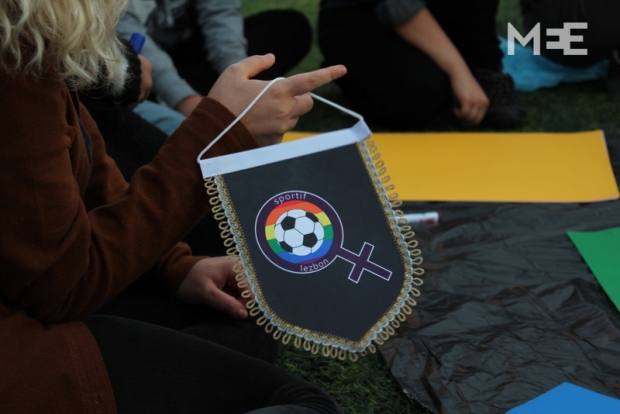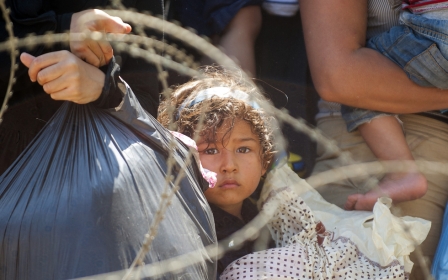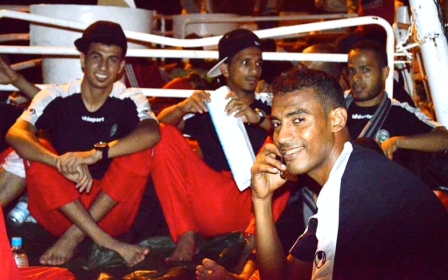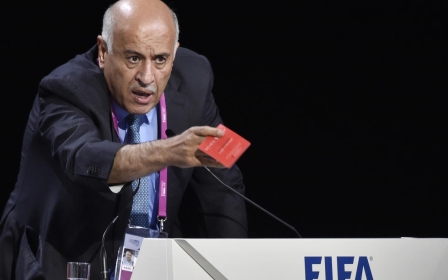Sportif Lezbon: Turkey’s first LGBT football team
ANKARA - “Football is the world’s most popular sport,” says 25-year-old Selin Yildiz. “And it’s also a kind of bastion of masculinity; when you say ‘football,’ people think of men. So we want to turn it inside out – not only to challenge sexism and homophobia and transphobia, but also to oppose other harmful political ideologies.”
Selin is the star-player and co-founder of Sportif Lezbon, who claim to be Turkey’s first open LGBT (lesbian, gay, bisexual and transgender) football club. On 25 October they kicked off their second season in Ankara’s Ozgur Lig ("Free League") – an alternative football league created by activists.
The start of the season was postponed for two weeks following the bombing of a peace rally outside Ankara’s central train station on 10 October which killed 102 people – Turkey’s deadliest terrorist attack.
The country has witnessed growing instability and violence since June when the Justice and Development Party (AKP) – a socially conservative party with its origins in Islamism – failed to win a parliamentary majority for the first time since taking power in 2002. A divisive election campaign was held for snap polls on 1 November.
Sportif Lezbon’s story reflects widening polarisation in Turkey, where - while social conservatism has grown - a liberal opposition movement, struggling for LGBT rights, is also blossoming.
'No lesbians on my team’
“To survive on the pitch you have to become kind of ‘masculine,’” explains Selin in the Ankara suburb of Dikmen, amid shouts, chanting and the occasional metallic hiss as footballs strike the fences surrounding pitches hosting Ozgur Lig matches. Selin grew up in Istanbul playing football in the street and at school, often against boys. “Sometimes during the matches I was hurt but I couldn’t show it, because people would say things like ‘don’t play like a girl’. It’s an insult.”
Selin excelled – in 2005 she joined Kartalspor, a professional women’s team in Istanbul.
By the age of 13 or 14 she had started to realise that she was attracted to women: “I thought it was a kind of illness and I would recover,” recalls Selin. “At the same time, deep down, I knew it wasn’t something temporary.”
Sexism and homophobia are prevalent in both Turkish society and football. It is difficult for LGBT people to be open about their sexuality and work in many professions. The Turkish military regards homosexuality as a psychosexual disorder and gay men are usually exempt from military service. The BBC reported that gay conscripts being asked if they like football, a question that acts as a barometer of straight masculinity. Sexist and homophobic chanting is prevalent in Turkish football stadiums.
Selin didn’t dare come out while playing for Kartalspor – she later learned that some of her teammates were lesbians but their sexuality was not discussed openly. “My coach was always talking about there being ‘no lesbians on my team’,” she says.
Selin played for Kartalspor for two years but she drifted away from football as she focused more on studying. She still played football occasionally but only as a kick-about.
The idea for Sportif Lezbon began around two years ago when Selin and a group of bisexual and lesbian friends went for a picnic and played a match. They had so much fun that they decided to form teams, but their matches were disorganised and only close friends and activists were playing. They wanted to take a daring step and open a team up to the public. Then, earlier this year, an opportunity arose in the newly formed Ozgur Lig.
Gezi football
The league’s first season kicked off in April 2015 – there were 14 teams, many of which have concepts linked to activism. A player for Karsi Takim [‘Against team’], Sportif Lezbon’s first opponents of the new season, said that the league brought different kinds of people together, such as anarchists, Kurds and LGBT people - "Gezi football,” he called it, in a reference to widespread anti-government protests in 2013.
The league opposes industrial football, sexism, patriarchy, homophobia, transphobia and racism, and seeks to promote grassroots football and political opposition to the AKP. Matches are seven-a-side and this season the league has expanded to 19 teams.
Tanju Gunduzalp, a 45-year-old journalist, plays for Solteki – a mixture of players from a leftist newspaper and a cycling club. He said he didn’t take football too seriously, which he illustrated by introducing his "teammate" Itir – a six-year-old golden retriever who’d just been rushing madly back and forth across the pitch before a match.
But he said that the league has serious activist aims, and that they had made significant progress in terms of gender balance; only three teams had female players when the league was launched, but by the end of the first season only one team had no female players.
Gunduzalp argued that prejudice is not limited to social conservatives in Turkey: “Socialists have their own prejudices and this includes homophobia. This is why Sportif Lezbon is an important team.”
Ozgur Lig partly took its inspiration from some of the alternative leagues with a similar ethos that have been set up in Istanbul, including Gazoz Ligi, Efendi Lig and Karsi Lig. At least two other LGBT teams have formed recently in Istanbul, including Atletik Dildoa and Queer Park Rangers.
'People like us get beaten or killed'
Last season Sportif Lezbon finished in seventh place. Although they haven’t faced any negative attitudes within the Ozgur Lig, it was the first time that many players on other teams had met and played against open LGBT people. “Our goalkeeper is now famous for having conceded goals against every sexual orientation,” remarked a player from KaraKızıl, a group of left-wing Genclerbirligi fans.
Although Sportif Lezbon is predominantly comprised of lesbians, people of all genders and sexualities play for the team.
“I joined the team because I wasn’t happy about it all being lesbians! I wanted trans people to be represented,” said Demhat Aksoy, a 22-year-old transgender woman. Demhat is a member of Pembe Hayat (Pink Life), an LGBT activist group.
“If you’re an activist you don’t have the chance to be in the closet. Trans people like us can be beaten or killed every day.”
She experienced beatings from family members for a couple of years when she was younger. “Now they have just about accepted me as a ‘gay man’ – for them it’s somehow preferable to being transgender.”
Word play
As well as their feats on the pitch, Sportif Lezbon use humorous slogans, banners and chants as part of their arsenal of dissent (their name is an echo of famous Portuguese club Sporting Lisbon).
Some are difficult to translate from Turkish because they involve slang, rhyme and wordplay, and often subvert pop songs – although some are relatively straightforward:
- “Lesbians on the pitch/boobs in the air”
- “Truck driver lesbians [slang for 'butch’]/come and play”
They have a chant which is deployed as affectionate abuse toward opponents:
- ‘[name of team]/come here/do fisting with the lesbians”
Sportif Lezbon’s players held a workshop on 24 October, run as part of Football Against Racism in Europe’s (FARE) "Football People" action weeks initiative, encouraging more women to become involved with the team and to come up with their own slogans. “There is clearly a need for what we are doing in an activist sense,” remarked one Sportif Lezbon player, “as many people who’ve come here today don’t even like football!”
Elections, violence, and polarisation in Turkey
On Sunday, as the afternoon light muted into evening and Sportif Lezbon’s match neared, a wintery cold began to bite. Several people remarked that there were many more players and spectators last season – partly because it was held over spring and summer, but also because of the bombing on 10 October. “Many people are depressed and they don’t want to leave their houses … they lost their enthusiasm for life,” said Gunduzalp.
The bombing – thought to be carried out by terrorists affiliated with the Islamic State (IS) group - was the third major attack in recent months that targeted mostly leftist and Kurdish activists, many of whom are linked to the pro-Kurdish HDP, which entered parliament for the first time in the inconclusive June elections.
Ozgur Lig activists blame the government for failing to protect peaceful rallies from attacks and they accuse Erdogan of inciting violence to create instability in the run-up to the elections. A ceasefire between the military and the PKK - an armed Kurdish group seeking autonomy, which is designated by the Turkish authorities as a terrorist organisation – broke down in July.
The AKP’s perceived growing authoritarianism, social conservatism and intolerance of nonconformity were significant factors in the Gezi protest movement two years ago. An intolerance of dissent has found its way into Turkish football. On 24 October three Genclerbirligi fans – some of whom are connected to the Ozgur Lig – were detained and fined for displaying banners at a football match in Ankara protesting the bombings.
For many women and LGBT people in Turkey, life under AKP rule has been a mixture of progress and polarisation, a kind of flourishing under siege.
LGBT people have become a more visible and confident presence in major cities, LGBT organisations have proliferated, and large-scale gay pride events have been held; yet, activists also accuse the AKP of using increasingly sexist and homophobic rhetoric. Some research suggests that violence against women has soared and violence and discrimination against LGBT people remains pervasive under the AKP’s tenure.
This year’s gay pride event was cancelled at the last minute and attendees were attacked by the police. During 12 years in power the AKP have failed to introduce legislation that prohibits discrimination on grounds of sexuality.
Resistance to the AKP and the recent violence therefore is a major part of the Ozgur Lig’s aim. “Our league’s slogan for this season is 'freedom for peace' so we are resisting these terrorist attacks through football,” says Selin.
A narrow victory
Several pre-match cigarettes seemed to have no bearing on Selin’s performance. She is a tricky winger with the flawless ball control of a video game player - skipping past opponents with ease, firing crosses towards the strikers. On the side lines, a substitute wrapped herself in a rainbow flag to keep warm. Sportif Lezbon took an early lead and went on to win the match 9-8.
Sportif Lezbon aim to attract more players and supporters, and they hope to play in a future LGBT Olympics.
They also want to use the club to reach out and support LGBT footballers across the country. Selin knows professional lesbian players who like the idea of Sportif Lezbon but feel that they can’t join or support the team publicly because they feel they have to keep their sexuality secret.
But for Selin, the Ozgur Lig has fulfilled its name and given her a degree of freedom.
“I’m able to play football openly alongside my ideology and my sexual identity,” she says. “Lezbon is my dream come true.”
New MEE newsletter: Jerusalem Dispatch
Sign up to get the latest insights and analysis on Israel-Palestine, alongside Turkey Unpacked and other MEE newsletters
Middle East Eye delivers independent and unrivalled coverage and analysis of the Middle East, North Africa and beyond. To learn more about republishing this content and the associated fees, please fill out this form. More about MEE can be found here.





